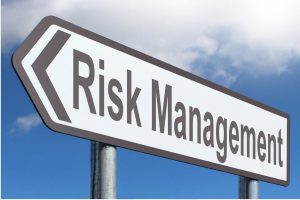6 Risks in International Trade & How to Manage Them
This is a guest post by Ummul Fidha.

Risk Management Picture — Nick Youngson CC BY-SA 3.0 Alpha Stock Images
Businesses involved in international trade have to deal not just with risks locally but also other business development risks such as ethics, transportation, intellectual property, credit, currency, and a lot more.
These risks can obstruct the smooth running of the business, and hence, appropriate measures need to be taken to limit their effects. Here are 6 risks commonly faced by businesses involved in international trade and the effective ways to manage them.
1. Credit Risk
Counterparty or credit risk is the risk associated with not collecting an account receivable. There are numerous ways in which businesses can guard themselves against this risk while expanding to global markets.
✔ Take payment in full [or a decent percentage of money upfront]
Taking 100 percent of the amount owed, or a fair percentage, before rendering the services at the time of the placement of an order can be used to cut down administrative expenses and finance charges. This eliminates the risk of non-payment. Although this may be difficult for new businesses and exporters, it can be worked out with little negotiations.
✔ Letter of credit
This refers to a commitment issued by a financial institution wherein the institution agrees to pay a set amount to the service/product provider in exchange for delivery within a set timeframe. This offers protection to both the seller and the buyer. It includes a detailed description of the shipment as well as the terms of sale.
There are several other techniques available for limiting credit risk. You can try what works best for you.
2. Intellectual Property Risk
This risk involves third parties making unauthorized use of the strategic information of a business or property that affects the value of services or products offered by a business, either directly or indirectly.
These risks increase tenfold when doing business overseas because of the difficulties that exist in defeating business rights remotely. This can be avoided by registering the corporate names as well as the trademarks before signing an agreement in any country.
It will also be beneficial to constantly modify and improve your services or products to remain ahead of the competition.
3. Foreign Exchange Risk
This usually concerns the accounts payable and receivable for contracts that are, or soon would be, in force. Foreign exchange rates are in flux constantly. Hence, businesses would be forced to make conversions of the funds generated overseas at rates lower than what is budgeted.
This is the reason why it is crucial for businesses to have an appropriate exchange policy in place. This will help in –
● Stabilizing profit margins over sales made
● Mitigating the negative impact of fluctuating rates on sales and procurements
● Enhancing cash flow control
● Simplifying domestic and foreign pricing
Businesses need to identify foreign exchange risks to frame an effective policy. It is also essential to recognize the tools available for hedging these risks and carry out a comparative analysis on a regular basis for selecting the best tool available.
4. Ethics Risks
It is vital to maintain a high ethical standard when offering any product or service in a global market. Companies may face certain questions pertaining to their values at any point while doing international trade.
Social conditions and customs vary from country to country, and hence, it is necessary to be especially vigilant. You need to make sure that your foreign suppliers and partners adhere to your values and rules regardless of where they operate from.
5. Shipping Risks
Whether you are shipping goods abroad or locally, you may face issues such as contamination, seizure, accident, vandalism, theft, loss, and breakage. Before shipping any goods to the buyers, you need to make sure to have sufficient insurance.

The International Chamber of Commerce has laid down rules for each party involved in international trade and their responsibilities with regard to shipping risk. It is best to go through the rules and take necessary precautionary steps.
6. Country and Political Risks
These are risks such as non-tariff trade barriers, central bank exchange regulations, or ban on the sale of certain products in specific countries. For instance, several countries have banned products obtained from threatened animal species.
There would be certain things that would never be under your control, such as sanctions, and you must be prepared in order to overcome them. You can find more information on such restrictions by checking the official website of the Ministry of Foreign Affairs and Trade for the specific country.
✔ Exchange Control Regulations
Several developing nations operate certain exchange control regulations that are associated with the flow of money from and to their country. You need to identify if these regulations are effective in the country which you intend to trade with. This is because these can delay your payments.
✔ Prohibited Goods
You need to make sure to carry out basic research on the import/export allowances offered by the country you are interested to carry out your business in. There are many products that are prohibited or restricted in some countries.
For instance, what is acceptable in China may not be allowed in New Zealand. You need to make sure to check out all the rules pertaining to your target market in the country you are interested to carry out trade with.
Whenever you are exporting certain products, it is essential to get them verified so that they meet the requirements of the country you would be exporting to. It is mandatory to obtain an export certificate before you actually commence trading globally.
Customs will then verify the details associated with your export certificate. It is better to be familiar with all the rules that you are governed with while trading globally, rather than face hurdles at a later stage. This will help you operate your business without any hassles once you have set your roots.
This was a guest post by Ummul Fidha.
Author Bio
Ummul Fidha works as a Growth Assistant at AirTract.Com, a social platform wherein people ask questions, write articles, and share knowledge and experience. A Math graduate, who turned her passion into digital marketing, Fidha is now keen to develop SEO friendly content and build website traffic. She loves to dedicate her leisure time to creative stuff and design arts.





I’m glad you mentioned that you should take the cultural conditions of the country you’re working with into consideration when participating in international trade. The company I work for has experienced a lot of growth this year, so they have been talking about getting involved in international trade. The information you shared will definitely be useful for me as I participate in various planning meetings.